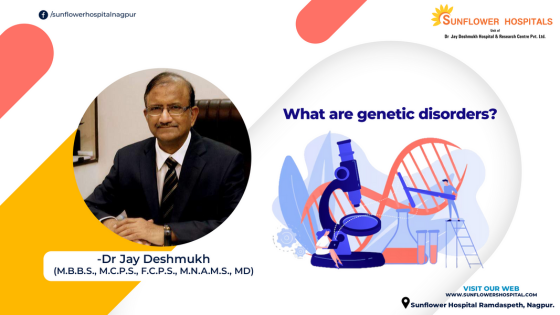How do genetic disorders occur?
Some are related to chromosomes. This occurs when chromosomes are duplicated or are missing. Chromosomes hold your genes or DNA within each cell. Some are due to multiple factors. They also occur along with gene mutations after exposure to certain diets, medications, chemical exposure, tobacco, and alcohol use. Some diseases occur due to single gene mutation.
What are the common types of genetic disorders?
Down syndrome or trisomy 21, Klinefelter syndrome, Triple X, and Turner are a few chromosomal disorders. Multifactorial disorders include diabetes, arthritis, autism, cancer, migraine headaches, heart attacks, and Alzheimer’s disease. High Cholesterol levels in certain families are mono-genetic disorders.
What are the causes of genetic disorders?
The DNA in your genes instructs the body to make proteins. Mutations disrupt these functions. Environmental factors lead to a genetic mutations that include chemical exposure, radiation exposure, smoking, and UV exposure from the sun.
What are the symptoms of genetic 4 disorders?
Symptoms vary depending on the organs affected. Vision or hearing loss, short stature, seizures or stroke, muscle stiffness or weakness, cleft lip or palate, developmental delays that include challenges with speech or social skills, and behavioural changes or disturbances are the common symptoms.
How can I prevent a genetic disorder?
Genetic counselling and testing can help you. It can assess your risk. It helps you to know the likelihood of passing some disorders on to your children.
What is the treatment of genetic disorders ?
Treatment can slow down disease progression or lessen the impact on your life. The treatment depends on the type of genetic disorder. Regular follow-up with your doctor is required to lessen the impact of genetic disorders. Most genetic disorders do not have a cure.
How do doctors test for genetic abnormalities?
Genetic tests on the DNA are commonly done. The cells can be obtained from blood, amniotic fluid, placental tissue, cells inside the cheek, and other tissues. The type of DNA sample used depends on the suspected anomaly. In pregnancy, screening tests or diagnostic tests are performed. Diagnostic tests are performed on fetal cells floating in amniotic fluid or cells from the placenta. Amniocentesis or chorionic villus sampling helps to obtain cells.
How are genetic disorders diagnosed?
Carrier testing is a blood test that identifies if you or your spouse are carrying a mutation. Blood testing from a pregnant person tells you about how likely it is that a fetus could have a common chromosome disorder. Newborn screening helps you to offer immediate and timely treatment to babies born with genetic disorders.


